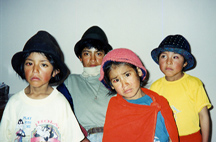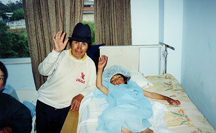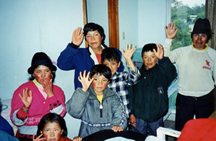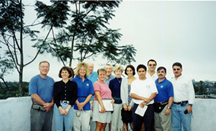Special to the Ocular Surgery News
By Dr. Albert A. Alley
Not many doctors would be content to act as "go-fers." But during our World Blindness Outreach mission trip to Ecuador in mid-July, my friend Dr. Raymond Dorsch, Jr., of Lebanon, Pennsylvania, says he considered it a privilege.
"I had talked about going along on the vision missions sometime," said Dr. Dorsch. "Even though they didn't need my specialty, I'm glad they found a place for an old orthopedic surgeon in that talented group of professionals."
As president of World Blindness Outreach, I was thrilled when Dr. Dorsch asked if he could volunteer for the medical team that visited Ecuador for our 40th eye mission. We work at the same hospital, and I knew he'd be a wonderful addition to our team. He did everything from helping out in surgeries and administering local anesthesia, to simply moving patients and refilling supplies.

We had been to Ecuador a few years ago and had repeated requests to return. This was the first opening in our WBO schedule to go back. In the past we have traveled with the help of various organizations, most of which are based in the United States. This trip was sponsored by the Ecuadorians themselves. They have established a nonprofit organization called Vista Para Todas, which means "Vision for All" - a wonderful title that says it all. Because of the tragedy of avoidable blindness, those of us associated with World Blindness Outreach continue to go to countries where access to health care that we in the United States take for granted can be a challenge.
One of the challenges for our team is adequate supplies and equipment for the many procedures we perform in a short period of time. We found it works best to be totally self-sufficient. This trip we took three microscopes, phaecoemulsification equipment, an A-scan, our own autoclave, the lens implants, all the surgical instruments, and everything else, right down to the sutures.

The cooperation and dedication of those in Ecuador were outstanding. It started when we entered the city of Santo Domingo De Los Colorados and saw a large banner saying, "Welcome World Blindness Outreach." It continued with Ecuador's talented Dr. Ruben Landazuri, with whom we worked hand-in-hand, and the nurses and other local people who helped along the way. We took over the one operating room in the clinic maintained by Vista Para Todas and converted two other rooms for surgeries, and the clinic staff couldn't have been more accommodating.
The patients came from all over the country. Vista Para Todas screened individuals in their clinics throughout Ecuador, referring the worst cases for our five days of surgery. In that time we performed 130 operations. The vast majority, 105, were cataract surgeries, and the rest were for strabismus.
This was not the first time we benefited from the expertise of pediatric ophthalmologist Dr. Denise Chamblee of Newport News, Virginia, in performing the strabismus procedures. She said, "Yes!" as soon as I asked her to participate on a previous trip, and, fortunately, she said yes again.

"The first trip was such an incredible experience that I was eager to go again," said Dr. Chamblee. "The rewards of performing these operations are deeper than what I usually feel in everyday medical work. This is a once-in-a-lifetime opportunity for most of these people, and their grateful responses reflect that. Our USA patients are appreciative, but somehow this is different. Plus, there is something special about successfully working together on something important under difficult conditions. I come away with a sense of happiness, contentment and accomplishment that is difficult to describe."
One group of patients that stood out for everyone was a small, closely-knit group from an indigenous tribe called the Cotapaxi. They traveled 10 hours to bring children who had severely crossed eyes. When we first saw the children, we were struck by their reddish-purple cheeks, and thought it must be a tribal custom to paint them that way. Then we learned that because of the harsh wind and sun at their altitude, this was a naturally occurring phenomenon. The skin on their cheeks was rough, like sandpaper, due to the exposure. They fascinated - and charmed - everyone.

"In spite of their eye problems, they were happy, friendly children," says Janelle Reese, COA, of Lebanon, Pennsylvania, who donated her skills as an operating room technician. "This is my second trip to South and Central America with Dr. Alley, and I was truly thrilled when he chose me again. I studied Spanish on my own so I could be a greater asset to the team. Before the next trip, I'm going to take Spanish lessons."
Although I appreciate everything that those on the team do to enhance their personal contribution, simply being willing to help and being sensitive to a situation are tremendous assets. Like everyone on the team, Dr. Chamblee demonstrated that talent over and over, particularly with the Cotapaxi people.
"Although we couldn't communicate with them very well because of their dialect, we realized they had traveled a great distance and were hungry," said Dr. Chamblee. "I remembered I had kept the packs of peanuts that the airline gives you and gave them to one of the adults. They were so happy and grateful as they passed individual peanuts out one by one to the children. I'll never forget watching them scarf down those few nuts. Time and again these people exhibited such care and affection for each other. They were so financially poor, but emotionally rich."
Janelle Reese particularly remembers one child's reaction. "After her surgery for strabismus, one of the girls took my hand, looked at it closely, then, smiling, laid it gently against her cheek. I was so touched. Seeing the post-op changes and positive reactions of all the people was just amazing."
The differences after surgery also struck Dr. Dorsch. "Because I helped in many areas, I saw just about everyone who received surgery. Many older folks had to be led in because they couldn't see well enough to walk anywhere by themselves. Afterwards, they didn't have to be led anymore, and it was like a miracle to them. This was an incredible experience."
Others who joined in this incredible experience were Dr. Eduardo Romo Miller, ophthalmologist, of Nogalis, Mexico; Lisa Pritt, COT, operating room technician, of Smithfield, Virginia; William Ebinger, VHD, and Diane Ebinger, operating room and instrument technicians, respectively, of Leonard, Michigan; Franck Johannesen, A-scan technician, of Sarasota, Florida; Linda Alley Herndon, interpreter, of Pittsburgh, Pennsylvania; and Yvonne Sands, coordinator, of Hershey, Pennsylvania.
I am deeply grateful to those who volunteer with World Blindness Outreach and encourage all who have a medical skill to share their expertise with those in need, no matter where they live. You'll be amazed at the benefits YOU will receive.
<<Back to the main articles page










